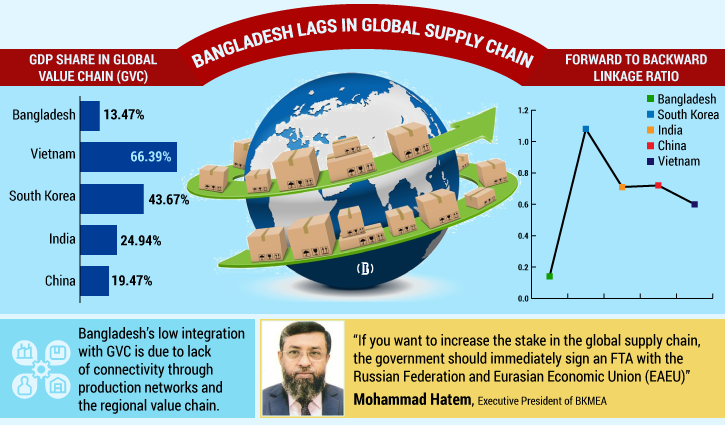Govt brainstorms to boost Bangladesh’s stakes in global supply chain
Asif Showkat Kallol || BusinessInsider

Graphics: Business Insider Bangladesh
The commerce ministry has been developing strategies for expanding Bangladesh’s stake in the global supply chain (GSC) to embrace challenges of the first-hand markets and promote export-led growth, an official said.
“We want to develop strategies to enhance our stake in the global supply chain considering all our export products, not only the apparels,” said a senior commerce ministry official.
He, however, acknowledged that without cooperation from some major importers like the USA, the government may not be able to develop such a strategy meticulously.
As part of the initiative, the commerce ministry has asked the commercial counsellor stationed at Bangladesh embassy in the USA to prepare a report advising the government as to what infrastructures or services required for further improvements to accomplish an expanded stake in export trade.
According to a Bangladeshi counsellor’s letter, to raise the share in global supply chains, Dhaka’s primary focus should be on improving the capacity of the economy.
The memo said there are needs for scaling up structural improvements in the cases of diversification of the economy, skills development and institutional strengthening.
The letter also reads the government will attract FDI, ensuring compliance, availability and improving access to finance development, know-how and addressing overall quality standards.
Adherence to technical upgradation and standard testing and accreditation mechanisms, and, importantly social and environmental standards are increasing essentials for export products to be competitive in GSC, it added.
The memo revealed how the United State can be of assistance to Bangladesh for grabbing some extra share of the global supply chain.
It said the government can simplify business procedures, reduce transaction costs, invest in improving trade related logistics and trade related infrastructure such as upgrading post facilitation.
Such interventions have an overarching impact on export competitiveness at the national and sectoral levels.
Some of the key areas where appropriate interventions are required are, ensuring smooth operations of all the major ports, addressing inefficiencies at customs clearance points, adjusting import duties and taxes for the raw materials or other goods that are treated as essentials and continuing with the stimulus package like low cost financing to export-led businesses, the memo pointed out.
It said the country’s backward and forward linkage integration with the global value chain (GVC) are much lower than Bangladesh’s peers, partly due to a lack of connectivity through production networks and the regional value chain (RVC).
Last year, for instance, GVC share in Bangladesh’s GDP was 13.47 percent, compared to Vietnam’s 66.39 percent, South Korea’s 43.67 percent, China’s 19.47 percent, and India’s 24.94 percent, according to a Centre for Policy Dialogue (CPD) research.
During the period, the country’s forward linkage to backward linkage ratio stood at 0.14, compared to Vietnam’s 0.60, India’s 0.71, China’s 0.72 and South Korea’s 1.08, respectively.
“We have explored the new international markets to increase the volume of the global supply chain for the country’s export products,” said Executive President of BKMEA, Mohammad Hatem.
The BKMEA delegation already visited Russia, South Africa, and Ukraine to explore comparatively new markets for enhancing Bangladesh’s out-bound trade.
“If you want to increase the stake in the global supply chain, the government should immediately sign an FTA with the Russian Federation and Eurasian Economic Union (EAEU),” he told the Business Insider Bangladesh on Sunday.
Eurasian countries are Russia, Armenia, Belarus, Kazakhstan and Kyrgyzstan, respectively.
























